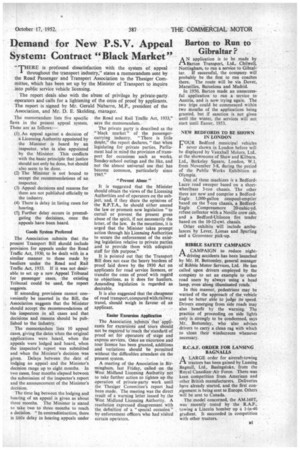Demand for New P.S.V. Appeal
Page 35

If you've noticed an error in this article please click here to report it so we can fix it.
System: Contract "Black Market"
" THERE is profound dissatisfaction with the system of appeal
I throughout the transport industry," states a memorandum sent by the Road Passenger and Transport Association to the Thesiger Committee, which has been set up by the Minister of Transport to inquire into public service vehicle licensing.
The report deals also with the abuse of privilege by private-party operators and calls for a lightening of the onus of proof by applicants. The report is signed by Mr. Gerald Nabarro, M.P., president of the Association, and Mr. D. E. Skelding, manager.
The memorandum lists five specific flaws in the present appeal system. These are as follows:—
(1) An appeal against a decision of a Licensing Authority appointed by the Minister is heard by an inspector, who is also appointed by the Minister. This conflicts with the basic principle that justice should not only be done, but should also seem to be done.
(2) The Minister is not bound to accept the recommendations of an inspector.
(3) Appeal decisions and reasons for them are not published officially to the industry.
(4) There is delay in listing cases for hearing.
(5) Further delay occurs in promulgating the decisions, once the appeals have been heard.
Goods System Preferred
The Association submits that the present Transport Bill should include provision for appeals under the Road Traffic Act, 1930, to be dealt with in a similar manner to those made by hauliers under the Road and Rail Traffic Act, 1933. If it was not desirable to set up a new Appeal Tribunal for passenger cases, the existing Tribunal could be used, the report suggests.
If amending provisions cannot conveniently be inserted in the Bill, the Association suggests that the Minister should accept the recommendations of his inspectors in all cases and that decisions and reasons should be published to the industry.
The memorandum lists 10 appeal cases, giving the dates when the original applications were heard, when the appeals were lodged and heard, when the inspector's report was submitted and when the Minister's decision was given. Delays between the date of lodging an appeal and the Minister's decision range up to eight months. In two cases, four months elapsed between the submission of the inspector's report and the announcement of the Minister's decision.
The time lag between the lodging and hearing of an appeal is given as about three months. The Minister is stated to take two to three months to reach a deeision. "In contradistinction, there is little delay in hearing appeals under the Road and Rail Traffic Act, 1933," says the memorandum. • • The private party is described as the "black market' of the passengercarrying industry. "There is little doubt," the report declares, "that when legislating for private parties, Parliament had in mind the provision of transport for occasions such as works, Sunday-school outings and the like, and not the almost universal use that has become common, particularly since 1945."
"Prevent Abuse" It is suggested that the Minister should obtain the views of the Licensing Authorities and of operators on the subject, and, if they share the opinions of the R.P.T.A., he should either amend the law or promote new legislation "to curtail or prevent the present gross abuse of the spirit, if not necessarily the letter, of the law. In the meantime, it is urged that the Minister takes prompt action through his Licensing Authorities to secure the enforcement of the existing legislation relative to private parties and to provide them with adequate staff for this purpose."
It is pointed out that the Transport Bill does not ease the heavy burdens of proof laid down by the 1930 Act on applicants for road service licences, or transfer the onus of proof with regard to objections, as it does for hauliers. Amending legislation is regarded as desirable.
It is also suggested that the cheapness of road transport,compared with railway travel, should weigh in favour of an applicant.
Easier Excursion Application The Association .submits that 'applicants for excursioni and tours should not be required to'reach the" standard of proof set for operators' of stage and express services. Once an excursion and tour licence has been granted, additions and variations should be permitted without the difficulties attendant on the present system.
A meeting of the Association in Birmingham, last Friday, called on the West Midland Licensing Authority not to take further action to tighten up the operation of private-party work until the Thesiger Committee's report had been made, The meeting was the direct result of a warning letter issued by the West Midland Licensing Authority. A resolution expressed disagreement with the definition of a "special occasion" by enforcement officers who had visited certain operators.




















































































